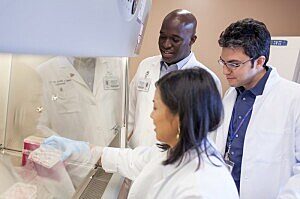Your body’s secret weapon(itself)

It all started with a book.
While he was in college, Duane A. Mitchell, M.D., Ph.D., read “The Transformed Cell,” a book that truly “transformed” his life.
Written by Steven A. Rosenberg, M.D., Ph.D., chief of surgery at the National Cancer Institute, the book details the years Rosenberg spent developing a treatment for melanoma using a patient’s own immune system, a process known as immunotherapy. Reading about Rosenberg’s work inspired Mitchell’s own interest in immunotherapy.
Now the co-director of the Preston A. Wells Jr. Center for Brain Tumor Therapy and director of the UF Brain Tumor Immunotherapy Program, Mitchell’s interest in immunotherapy has blossomed into a full-blown research career. Before coming to UF, Mitchell worked for eight years at Duke University, where he was associate director of the brain tumor immunotherapy program and held multiple positions related to brain tumor research.
Since arriving at UF Health in July 2013, Mitchell and his team have received funds from organizations such as the Department of Defense and Accelerate Brain Cancer Cure to support UF’s first pediatric brain tumor immunotherapy trial.
Mitchell is the principal investigator for the trial, which will begin enrollment this year.
“We think the University of Florida has a real opportunity to be one of the leading centers for immune-based treatments for patients with malignant brain tumors and to make a significant contribution to hopefully advancing the field,” Mitchell said.
The primary aim of UF’s pediatric trial is to help patients with two particular types of tumors. The first, medulloblastomas, are one of the most common central nervous system tumors seen in children and they occur in the cerebellum. The second type are primitive neuroectodermal tumors, which are very similar to medulloblastoma tumors, but occur in the cerebrum.
The pediatric immunotherapy trial uses what is known as adoptive cellular therapy. This is where some of a patient’s immune cells are removed from the body, trained to fight tumors and then returned to the patient to help strengthen their immune system.
Mitchell said the trial is divided into two phases. The first phase of the trial involved testing the safety of the treatment to see if it could be used with a larger number of patients. The first phase ended in the summer of 2013 while Mitchell was still at Duke University. Mitchell said results showed adoptive cellular treatment was feasible and safe for pediatric patients.
In the second phase, which starts this year at UF, more patients will participate in the trial to see how effective the treatment is at preventing or delaying tumors. The second phase will also compare the outcomes of patients receiving immunotherapy along with standard treatments, such as surgery, radiation to the brain and spine, and chemotherapy to those of a historical group of patients who received standard therapy alone.
Mitchell said that the way UF’s Evelyn F. and William L. McKnight Brain Institute is structured is a big attraction to him and his team. He thinks it is a huge advantage for researchers and clinical doctors to work together in the same building.
Mitchell said UF’s unique organization within the McKnight Brain Institute and Preston A. Wells Jr. Center for Brain Tumor Therapy is especially helpful for the pediatric immunotherapy trials. There are more than a dozen departments and investigators involved with the research, including experts from neurosurgery, pediatrics, stem cell transplantation, the Powell Gene Therapy Center and the Clinical and Translational Science Institute.
“You don’t always have the required knowledge housed in just one person,” Mitchell said. “Proximity to others ends up being more valuable than you initially think.”